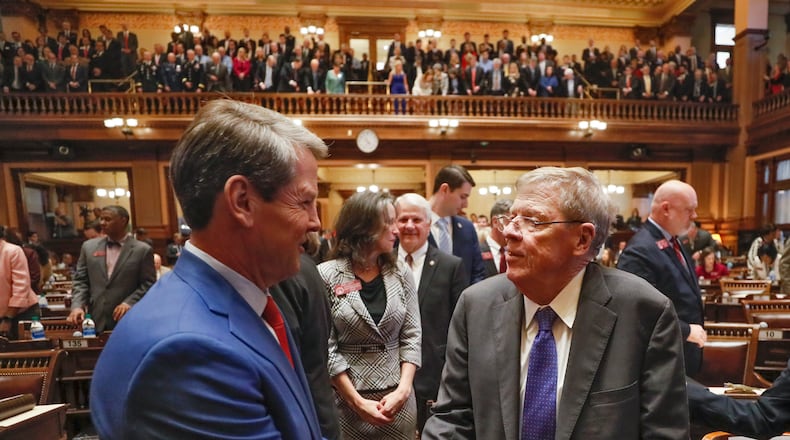The 2020 Georgia legislative session began last week and lawmakers worked quickly to propose some changes that could impact higher education in the state.
Here’s a breakdown of these and other issues in the latest edition of AJC On Campus.
Dual enrollment changes
The Georgia Senate's higher education committee approved a bill Thursday aimed at reducing costs for the state's popular, but increasingly expensive, dual enrollment program that pays for high school students to take college courses. The biggest change would generally restrict how many credit hours students can take. About 52,000 students currently take the courses, nearly double its enrollment four years ago. The bill's proponents say the rising costs are a problem. The legislation, which got the green light from Gov. Brian Kemp's office, now goes before the entire Senate.
Other legislation
Credit: Chris Graythen
Credit: Chris Graythen
A few more bills were introduced last week. Among them are House Bill 766 would create an escrow account for college athletes to be distributed on a pro rata basis. The AJC first reported on the plan in October. Another one is House Bill 736, which would give student loan debt relief for teachers working in some public schools that need more educators.
Georgia Student Finance Commission leadership change
So, the folks who manage the money for the dual enrollment program will have a new leader. Caylee Noggle, president of the Georgia Student Finance Commission, will become the state's chief management officer. Gov. Brian Kemp made the announcement Wednesday. Noggle is the latest management change Kemp has made involving higher education. The governor last month named Greg Dozier commissioner of the Technical College System of Georgia and moved the former commissioner, Matt Arthur, to head of the state's Professional Standards Commission. Kemp's office did not name Noggle's replacement.
Higher education leaders chosen for state task force
Lt. Gov. Geoff Duncan last week picked some prominent names in Georgia’s higher education world to serve on a task force to achieve a pretty big goal: making the state the “Technology Capital of the East Coast.” The members include former Georgia Tech president G.P. “Bud” Peterson and Barbara Rivera Holmes, a member of the state Board of Regents. Another familiar name on the task force: former U.S. Sen. Johnny Isakson.
UGA’s Parkinson’s research program
Speaking of Isakson, Gov. Brian Kemp announced in his State of the State address Thursday that the University of Georgia will launch a professorship to develop treatments for the disease, which forced the senator to retire at the end of 2019. Here's more about the plan.
UGA celebrates scholarship milestone
Georgia leaders have been criticized a lot in recent years for not doing enough to help low-income students pay for college. The University of Georgia embarked on its own effort three years ago to provide needs-based scholarships for qualified students. Last week, the university announced it has given scholarships to more than 500 students. The school said it has raised $77 million for the fund.
U.S. House rebukes federal student borrower plan
The U.S. House of Representatives passed a resolution Thursday rebuking the U.S. Department of Education’s borrower defense rule changes, which lawmakers said would make it tougher for college students to receive loan debt forgiveness if a school has defrauded students. Georgia House member Lucy McBath has been a proponent of guidelines that make it easier for students to get relief if a school closes, like last year’s abrupt closure of Argosy University, which had a campus in Georgia.
New report on college president pay
The Chronicle of Higher Education released a report last week with numbers that intrigue many in the industry. How much do presidents at some of the nation's top private colleges and universities make? The data is from 2017 (It takes time, for a variety of reasons, to compile the numbers). Savannah College of Art & Design President Paula S. Wallace was the top money earner from Georgia. Her total compensation was $2,196,808, which was ninth nationally. Emory University President Claire Sterk, who is leaving her position later this year, was the only other private university president in the state to top seven figures. Her total compensation was $1,158,836, which was 45th nationally.
UNG’s codebreakers
The University of North Georgia shared news that a team of students, faculty and staff won the National Security Agency’s Codebreaker Challenge. UNG’s score was four times greater than the second-place finisher, Georgia Tech. The competition began a few months ago and ended on Jan. 10. UNG had 287 players in the challenge, more than any participant. The teams had to perform tasks such as infiltrating a simulated terrorist network mobile application and preventing a simulated terrorist attack.
This week’s number
$104,642,283
That’s how much the state paid for the dual enrollment program in fiscal year 2019, which began July 1, 2018 and ended June 30, 2019.
About the Author
Keep Reading
The Latest
Featured





